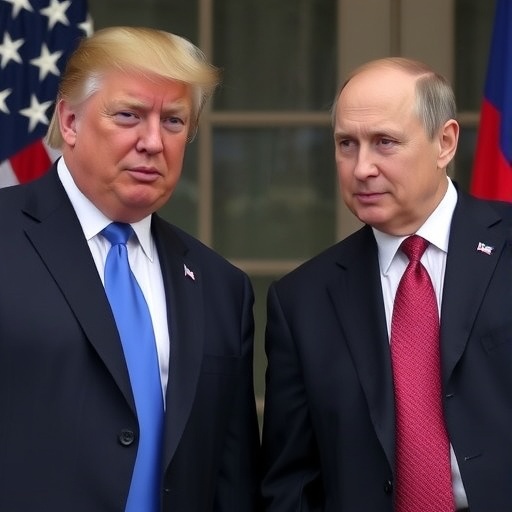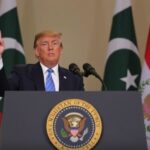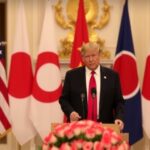Trump Cancels Putin Summit: Demands Ukraine Peace Deal Before Any Talks, Imposes Harsh Sanctions on Russian Oil
In a stunning diplomatic pivot, President Donald Trump has abruptly canceled a highly anticipated summit with Russian President Vladimir Putin, declaring that no meeting will occur until a concrete peace deal in Ukraine is firmly in place. This decision, announced late yesterday from the White House, marks a significant escalation in U.S. pressure on Moscow amid the ongoing war in Ukraine, now entering its third year. Trump emphasized that without progress toward ending the conflict, any direct talks with Putin are off the table, signaling a tough stance on international relations that could reshape global alliances.
- Trump’s Ultimatum: No Summit Without Ukraine Peace Deal
- New Sanctions Hammer Russian Oil Sector to Starve War Machine
- Global Reactions: From Kyiv’s Cheers to Moscow’s Defiance
- Energy Markets Brace for Turbulence Amid Sanctions Squeeze
- Prospects for Diplomacy: Escalation or Breakthrough on Ukraine Horizon?
The announcement came alongside fresh sanctions targeting major Russian oil companies, aimed at crippling Moscow’s war funding. These measures, detailed in an executive order signed by Trump, include asset freezes and export bans on entities like Rosneft and Gazprom Neft, which have been pivotal in sustaining Russia’s economy during the invasion. “We won’t sit down with aggressors until they stop the aggression,” Trump stated in a briefing, underscoring his administration’s commitment to Ukraine’s sovereignty. This move has sent shockwaves through international markets, with oil prices fluctuating wildly as investors brace for supply disruptions.
The backdrop to this cancellation is the protracted war in Ukraine, which began with Russia’s full-scale invasion in February 2022. Over 500,000 military casualties have been reported on both sides, according to estimates from the United Nations, while millions of Ukrainian civilians have been displaced. Trump’s decision reflects a broader strategy to leverage economic tools for geopolitical gains, drawing on his past experiences with sanctions during his first term. Critics and supporters alike are watching closely, as this could either force Putin’s hand or harden Russia’s resolve.
Trump’s Ultimatum: No Summit Without Ukraine Peace Deal
President Trump’s cancellation of the planned Putin summit, originally slated for next month in Geneva, stems from deep frustrations over stalled negotiations in Ukraine. In a series of pointed remarks, Trump outlined his conditions: a verifiable ceasefire, withdrawal of Russian troops from occupied territories, and guarantees for Ukraine’s territorial integrity. “Putin needs to understand that peace in Ukraine isn’t optional—it’s the price for any dialogue,” Trump said, echoing sentiments from his campaign promises to end ‘endless wars’ swiftly.
This ultimatum isn’t entirely new for Trump, who has long touted his deal-making prowess in foreign policy. During his 2016-2020 presidency, he imposed sanctions on Russia over election interference and the annexation of Crimea, yet maintained a personal rapport with Putin. However, the scale of the current Ukraine crisis—marked by devastating attacks on civilian infrastructure, including the recent bombing of a Kyiv maternity hospital—has shifted the dynamics. U.S. intelligence reports, cited in the announcement, indicate that Russian oil revenues have funded over 40% of the Kremlin’s military spending since the invasion, making energy sanctions a direct hit.
Diplomatic insiders reveal that preparations for the summit had been underway for weeks, involving high-level talks between U.S. Secretary of State Mike Pompeo and Russian counterparts. The abrupt halt has left aides scrambling, with one anonymous White House official describing it as “a calculated risk to reset the board.” Trump’s approach contrasts with previous administrations’ multilateral efforts, like the Minsk agreements, which failed to prevent escalation. By tying the summit to a peace deal, he’s betting on unilateral pressure to yield results, potentially isolating Putin on the world stage.
Reactions within the U.S. political sphere are mixed. Senate Majority Leader Mitch McConnell praised the move as “principled leadership,” while House Democrats, led by Speaker Nancy Pelosi, called for congressional oversight to ensure sanctions are robustly enforced. Public opinion polls from Gallup show 68% of Americans support stronger measures against Russia, up from 55% last year, reflecting war fatigue and concerns over energy costs at home.
New Sanctions Hammer Russian Oil Sector to Starve War Machine
The Trump administration’s new sanctions represent one of the most aggressive economic salvos against Russia since the Ukraine invasion began. Targeting behemoths like Rosneft, which controls about 40% of Russia’s oil production, and Lukoil, the measures prohibit U.S. firms from engaging in transactions with these companies and freeze their assets in American jurisdictions. The Treasury Department estimates these sanctions could slash Russia’s oil export revenues by up to $30 billion annually, a figure that analysts say is crucial for funding the war effort.
“These aren’t just penalties; they’re a chokehold on the Kremlin’s lifeline,” Treasury Secretary Steven Mnuchin declared, highlighting how oil sales have propped up Russia’s ruble and military budget. Since the war started, Russia has rerouted exports to China and India to evade earlier Western bans, but these new U.S. actions aim to close loopholes by pressuring secondary markets. For instance, the sanctions include provisions for penalizing any third-country buyers who continue dealings with sanctioned entities, potentially disrupting global supply chains.
The immediate market fallout was evident: Brent crude prices surged 5% to over $85 per barrel following the announcement, as traders fretted over reduced Russian output. Europe’s dependence on Russian energy, already strained by the Nord Stream pipeline shutdowns, faces further tests. The International Energy Agency reports that sanctions could add 2 million barrels per day to global shortages if fully implemented, pushing prices toward $100—a scenario that could inflate U.S. gas prices to $5 per gallon by summer.
Russian officials downplayed the impact, with Kremlin spokesman Dmitry Peskov claiming Moscow has “diversified partners” to weather the storm. Yet, internal economic data leaked to Reuters suggests strain: Russia’s GDP contracted 2.1% last quarter, partly due to energy curbs. Experts like those at the Brookings Institution warn that prolonged sanctions could accelerate Russia’s pivot to non-Western alliances, strengthening ties with Iran and Venezuela for oil swaps. Trump’s strategy, however, is clear: use economic pain to compel Putin toward a Ukraine peace deal, even if it risks short-term global instability.
Global Reactions: From Kyiv’s Cheers to Moscow’s Defiance
The cancellation and sanctions have elicited a spectrum of responses worldwide, underscoring the high stakes in the Trump-Putin-Ukraine triangle. In Kyiv, Ukrainian President Volodymyr Zelenskyy hailed the move as a “vital boost,” tweeting that it reinforces America’s unwavering support. “Trump’s demand for a peace deal before any summit shows true resolve—Russia must end this war now,” Zelenskyy said in a televised address, where he detailed how U.S. aid has helped Ukraine reclaim 20% of occupied lands through counteroffensives.
NATO allies, meeting in Brussels yesterday, issued a joint statement endorsing the sanctions and urging coordinated European actions. German Chancellor Olaf Scholz, whose country has been weaning off Russian gas, committed to additional LNG imports from the U.S. to offset potential shortages. However, Hungary’s Viktor Orban, a Putin sympathizer, criticized the escalation as “provocative,” hinting at vetoing EU-wide measures—a fracture that could complicate unified Western pressure.
In Moscow, the reaction was predictably combative. Putin, addressing the Federal Assembly, dismissed Trump’s conditions as “ultimatums from a declining empire,” vowing to continue operations in Ukraine until “denazification” goals are met—a narrative the Kremlin has pushed since 2022. Russian state media framed the sanctions as economic warfare, with Foreign Minister Sergey Lavrov warning of retaliatory cyber measures and energy cutoffs to Europe. Analysts note that Putin’s defiance masks vulnerabilities: domestic protests over conscription have surged, and oligarchs tied to oil firms are reportedly pressuring for de-escalation.
Further afield, China’s Xi Jinping offered neutral mediation, while India’s Narendra Modi emphasized dialogue over confrontation. These responses highlight shifting global power dynamics, where Trump’s bold play could either rally the West or embolden autocrats. U.N. Secretary-General Antonio Guterres called for urgent talks, citing the humanitarian toll: over 10 million Ukrainians need aid, per UNHCR figures.
Energy Markets Brace for Turbulence Amid Sanctions Squeeze
As sanctions bite into Russia’s oil sector, global energy markets are on edge, with implications rippling from pump prices to stock portfolios. Wall Street analysts predict volatility, with ExxonMobil shares dipping 3% on fears of broader trade disruptions. The sanctions’ design—focusing on oil rather than broader finance—aims to minimize U.S. self-harm while maximizing pressure on Putin, but experts caution of unintended consequences.
According to the U.S. Energy Information Administration, Russia supplies 10% of global oil, and curbing its exports could exacerbate inflation worldwide. In the U.S., where Trump has championed energy independence, the policy aligns with boosting domestic production: permits for new drilling in Alaska and the Gulf have accelerated under his watch. Yet, environmental groups like Sierra Club decry the hypocrisy, arguing it perpetuates fossil fuel reliance when renewables could offer long-term stability.
Commodity traders are hedging bets, with futures indicating a 15% premium on non-Russian crude. For consumers, this translates to higher costs: the American Automobile Association forecasts a 20-cent jump in gas prices per gallon within weeks. In Europe, where winter heating demands loom, governments are stockpiling reserves—Germany’s storage levels are at 90%, but analysts warn of blackouts if Russian flows halt entirely.
Looking at corporate impacts, Chevron and BP, with past Russian ventures, face compliance headaches. One BP executive told CNBC the sanctions “force a painful divorce” from lingering ties, potentially costing billions in write-downs. Trump’s team, however, views this as necessary collateral for a Ukraine peace deal, betting that sustained pressure will tip the scales.
Prospects for Diplomacy: Escalation or Breakthrough on Ukraine Horizon?
With the Putin summit off and sanctions in force, the path to a Ukraine peace deal remains fraught but not impossible. Trump’s administration has signaled openness to backchannel talks via neutral parties like Turkey, which brokered grain export deals last year. Envoys from the State Department are already in Istanbul discussing frameworks that include demilitarized zones and international monitoring.
Optimists point to historical precedents: Reagan’s arms control talks with the Soviets followed tough sanctions in the 1980s. If Putin blinks—perhaps due to mounting economic woes or military setbacks—a deal could emerge by year’s end, stabilizing Europe and lowering energy costs. Pessimists, including think tanks like the Atlantic Council, foresee stalemate, with Russia digging in for a prolonged attritional war.
Trump’s personal stake is high; success could burnish his legacy as a peacemaker, while failure risks accusations of isolationism. As winter approaches, with Ukraine’s frontlines hardening, the world watches whether these moves coerce Putin to the table or ignite further conflict. U.S. allies are ramping up military aid—$61 billion approved last month—ensuring Kyiv’s resilience. Ultimately, the coming months will test if economic levers can forge the peace deal Trump demands, reshaping the contours of global security.








